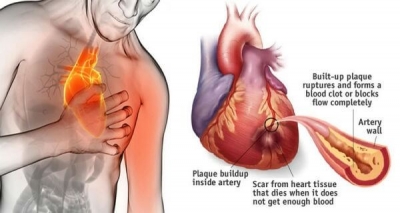
Your heart is a powerful muscle which pumps blood around your body. It is only the size of your fist and weights less than half a kilogram. Each and every day it pumps about 18,000 litres of blood around your body, and yet you are not normally aware that it is even beating. Run quickly upstairs, though, and you will soon feel it thumping away inside your rib cage.
A heart attack can occur when either or both sides of the heart are unable to pump sufficient blood to meet the needs of our body. Other prominent causes of a heart attack are abnormally high blood pressure (hypertension), coronary atherosclerosis (the presence of fatty deposits in the lining of the coronary arteries), and rheumatic heart disease.
A person with left-sided heart failure experiences shortness of breath after exertion, difficulty in breathing while lying down, spasms of breathlessness at night, and abnormally high pressure in the pulmonary veins. A person with right-sided failure experiences abnormally high pressure in the systemic veins, enlargement of the liver, and accumulation of fluid in the legs. A person with failure of both ventricles has an enlarged heart that beats in gallop rhythm – that is, in groups of three sounds rather than two.
|
Fact File: An electrocardiogram, or ECG, measures the electrical signals that the heart produces as it beats. These signals change when a person is suffering from certain medical conditions that affect the heart. |
Picture Credit : Google

